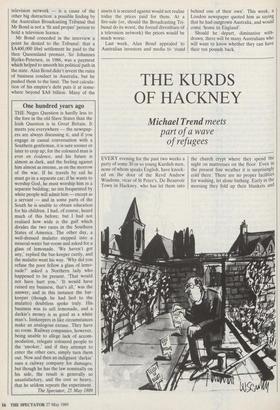One hundred years ago
THE Negro Question is hardly less to the fore in the old Slave States than the Irish Question is in Great Britain. It meets you everywhere — the newspap- ers are always discussing it, and if you engage in casual conversation with a Southern gentleman, it is sure sooner or later to crop up; for the coloured man is ever en evidence, and his future is almost as dark, and the feeling against him almost as intense, as on the morrow of the war. If he travels by rail he must go in a separate car; if he wants to worship God, he must worship him in a separate building; no inn frequented by white people will admit him — except as a servant — and in some parts of the South he is unable to obtain education for his children. I had, of course, heard much of this before; but I had not realised how wide is the gulf which divides the two races in the Southern States of America. The other day, a well-dressed mulatto stepped into a mineral-water bar-room and asked for a glass of lemonade. 'We haven't got any,' replied the bar-keeper curtly, and the mulatto went his way. 'Why did you refuse the poor fellow a glass of lemo- nade?' asked a Northern lady who happened to be present. 'That would not have hurt you.' It would have ruined my business, that's all,' was the answer; and in this instance the bar- keeper (though he had lied to the mulatto) doubtless spoke truly. His business was to sell lemonade, and a darkie's money is as good as a white man's. Innkeepers in like circumstances make an analogous excuse. They have no room. Railway companies, however, being unable to allege lack of accom- modation, relegate coloured people to the 'smoker,' and if they attempt to enter the other cars, simply turn them out. Now and then an indignant `darkie' sues a railway company for damages; but though he has the law nominally on his side, the result is generally so unsatisfactory, and the cost so heavy, that he seldom repeats the experiment.
The Spectator, 25 May 1889


















































 Previous page
Previous page